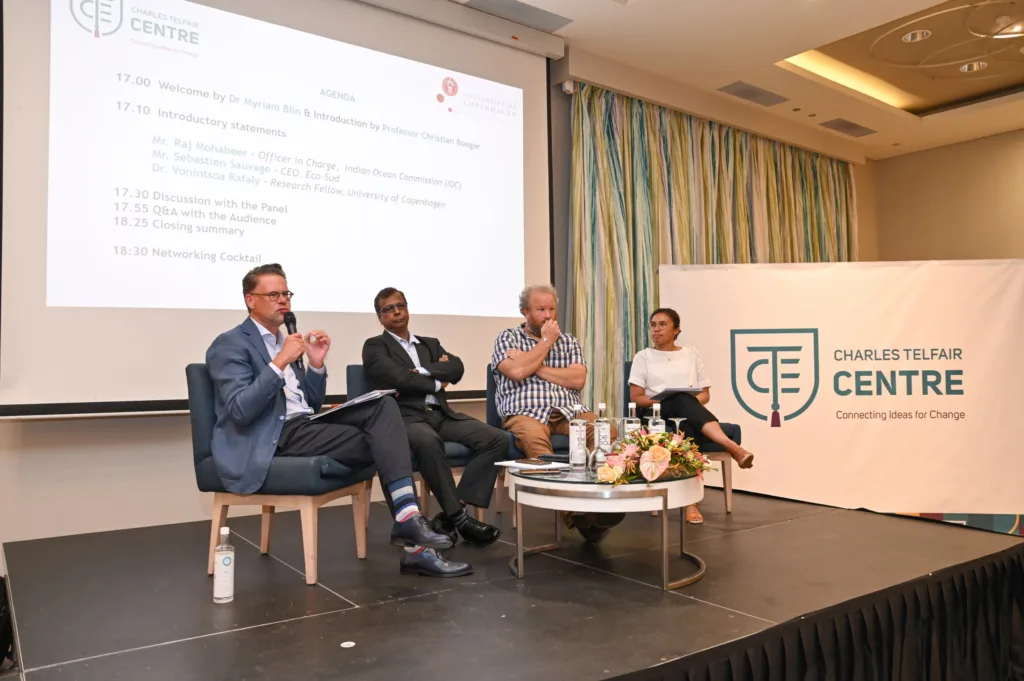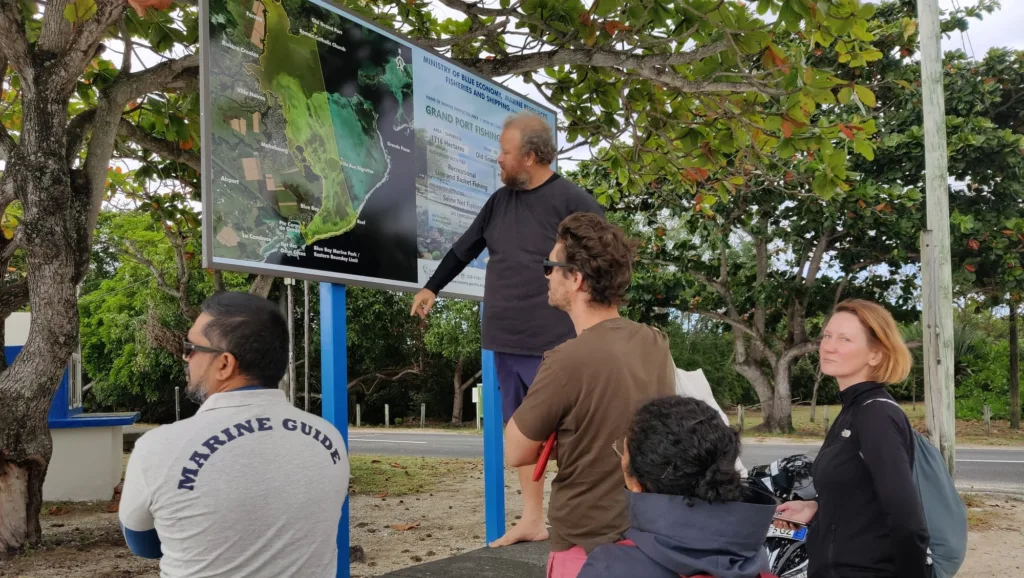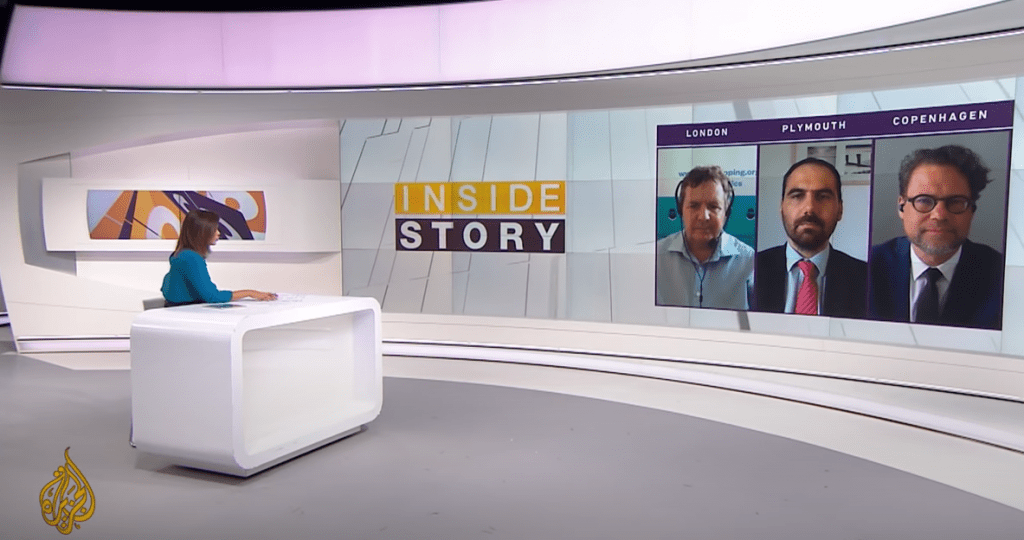In an episode of Monocle Radio’s The Briefing I discuss how the new mission Aspides by the EU is organized and why it matters. Listen to it here.
Category Archives: In the News
Writing retreat and field work in Mauritius
Over the last ten days I was with the team of the Ocean Infrastructure Research Group in Mauritius. Together we advanced the draft of our forthcoming book on ocean infrastructure and conducted field work on the 2020 Wakashio oil spill, which is one of our case studies.
In the book we develop a new understanding of global ocean politics by developing a framework centered on infrastructure. We argue that the concept of infrastructure opens productive new avenues for understanding global ocean politics that allows us to overcome the limits of thinking centered on territory, freedom or global commons. We show the evolution of the oceans as an infrastructural space, and show how we can rethink power, law, security and knowledge infrastructurally.

Fieldwork on shipping risks in small islands
Part of our stay in Mauritius was also a stakeholder workshop and a public event on shipping risks and the lessons from the 2020 Wakashio shipping accident which caused a major environmental disaster in the country. The event was covered in the national newspapers, and we also met with a range of stakeholders individually, including the minister on blue economy, fishing and shipping.

A particular important experience was a field visit to the site where the accident happened and the coastal region where the oil was spilled. The visit was organized by the local NGO EcoSud. It revealed that the clean up is completed, but that the disaster has some visible and lasting impact on the coastal eco-system, and there continues to be residues of oil in the mangrove forests. In other words, the disaster is not over, but will have to be managed carefully in the years to come.
New commentary on Russia’s spying activities in the North Sea
In a new commentary published in The Conversation I reflect on the recent reports of Russian spying activities in the North Sea and Baltic Sea region. While there are not many news in these reports, I argue that it implies to pay more attention to the North Sea as a critical security space, and to go beyond surveillance and invest in repair capacities to reduce the threat to infrastructures. Read the commentary here.
Consequences of the Nord Stream sabotage
The sabotage of the Nord Stream pipelines has drawn unprecedented attention to the under water domain and the criticality of subsea infrastructures. Indeed, the world economy depends on the ocean floor as never before in history. It is pipelines, electricity cables, and data cables, that connect the global economy.
Drawing on the research conducted as part of our ocean infrastructure research group, in particular our work on subsea data cables, I have been commenting in several news outlets on this issue, including the Wall Street Journal, Der Spiegel, and others. See the overview here.
An independent commentary on the consequences for the EU was published by The Conversation. A commentary co-authored with Tobias Liebetrau published in The Loop argues that we have to change our perspective of the under water space more generally.
The European Parliament discussed our report on October 6th and announced that our recommendations will inform an action plan on the protection of underwater infrastructures. In response, I published a commentary in EUObserver arguing that the action plan of the commission is not sufficient.
New commentary on India’s role in collective maritime security
As more and more geopolitical attention turns to the Western Indian Ocean, in a new commentary I explore the role of India in collective maritime security. I argue that India should continue on the course it charted last year in the UN Security Council: to work towards collective multilateral maritime security mechanisms on a regional and global level.
New Commentary on security in the Western Indian Ocean
In early 2022 a subtle, but substantial shift took place in the Western Indian Ocean’s security architecture: The Contact Group on Piracy off the Coast of Somalia (known as CGPCS) closed shop. It was replaced by a new format. Yet, not much action followed. In a new commentary, I investigates the prospects of the new grouping. Running through four scenarios, I argue that the group is most likely going to become a sleeping beauty.
New commentary on the maritime security architecture in the Western Indian Ocean
Reflecting on my recent participation in the Contact Group on Piracy off the Coast of Somalia (CGPCS) and the Shared Awareness and Deconfliction (SHADE) mechanism, I’ve published a commentary together with Timothy Walker from the Institute for Security Studies in Pretoria. We argue that the recent reform of the CGPCS to include other issues than piracy in its agenda is important but that careful thought needs to be put into the question of how deliberations will look like in future. Read the commentary here.
Green Shipping Must Go Beyond Decarbonization – new op-ed
Together with Jan Stockbruegger I have written an op-ed on green shipping and the need to incorporate accident prevention and resilience into the green agenda. It was originally published by Maritime Executive on 10.12.
“The shipping industry is the backbone of global trade and supply chains, with 90 percent of all goods transported by the sea. The Suez Canal closure or logistical challenges due to the COVID-19 crisis have demonstrated our dependency on maritime supply chains.
Yet the shipping industry is also a major polluter. It contributes up to three percent to global CO2 and greenhouse gasses. Reducing these emissions is vital to reach the climate targets of the 2015 Paris agreement. Yet shipping was not included in the Paris Agreement. The basic problem: Since shipping implies the transfer of goods from one country to another, to which one should the emissions be attributed?
Drawing on the efforts at the main regulatory body for global shipping, the International Maritime Organization, at a new milestone in shipping’s green energy transition was achieved at the COP26 climate conference in Glasgow.
Continue readingCommentaries on UN Security Council debate on maritime security
The UN Security Council held its first ever open debate on maritime security on August the 9th. While the Council discussed maritime crimes in earlier debates, and has been pro-active in addressing crimes, such as piracy, the open debate was a high level exchange focusing on the broader strategic picture. The fact that the meeting was held at the level of heads of state and minister, with among others India’s prime minister Mr. Modi, and Russian president Mr. Putin addressing the Council, documents that maritime security is increasingly a top priority.
The Security Council debate is an important yardstick for how the international community thinks about maritime security, what priorities are in the discourse and what responses and institutional developments it is likely to spur. To investigate the key take away points from the debate, I have written a series of comments on the debate.
In the first commentary, published with Maritime Executive on August,12th, I discuss consequences for the shipping industry. I argue that the debate indicates that the center of gravity of the maritime security debate is increasingly shifting away from the International Maritime Organization towards New York. This raises the question if and how the shipping community will want to engage with the UN debates. The commentary was also taken up in a story in Lloyds List.
The second opinion piece asks whether the United Nations require a new institutional set up for maritime security. This was one of the issues raised in the debate. In the comment I investigate different scenarios of how such a structure might look like. It was published with the Global Observatory.
Is global shipping in crisis?
Yesterday I had the opportunity to discuss in Al Jazeera’s Inside Story show the current situation in shipping. The global shipping industry is under significant stress at the moment due to the ongoing pandemic with adverse effect on global supply chains. In the show we were discussing what to do about this situation and the larger implications of our dependency on the global transport infrastructure and how it is regulated.
